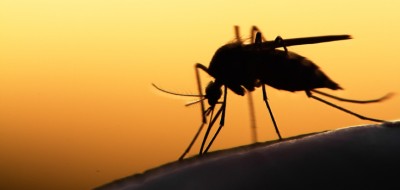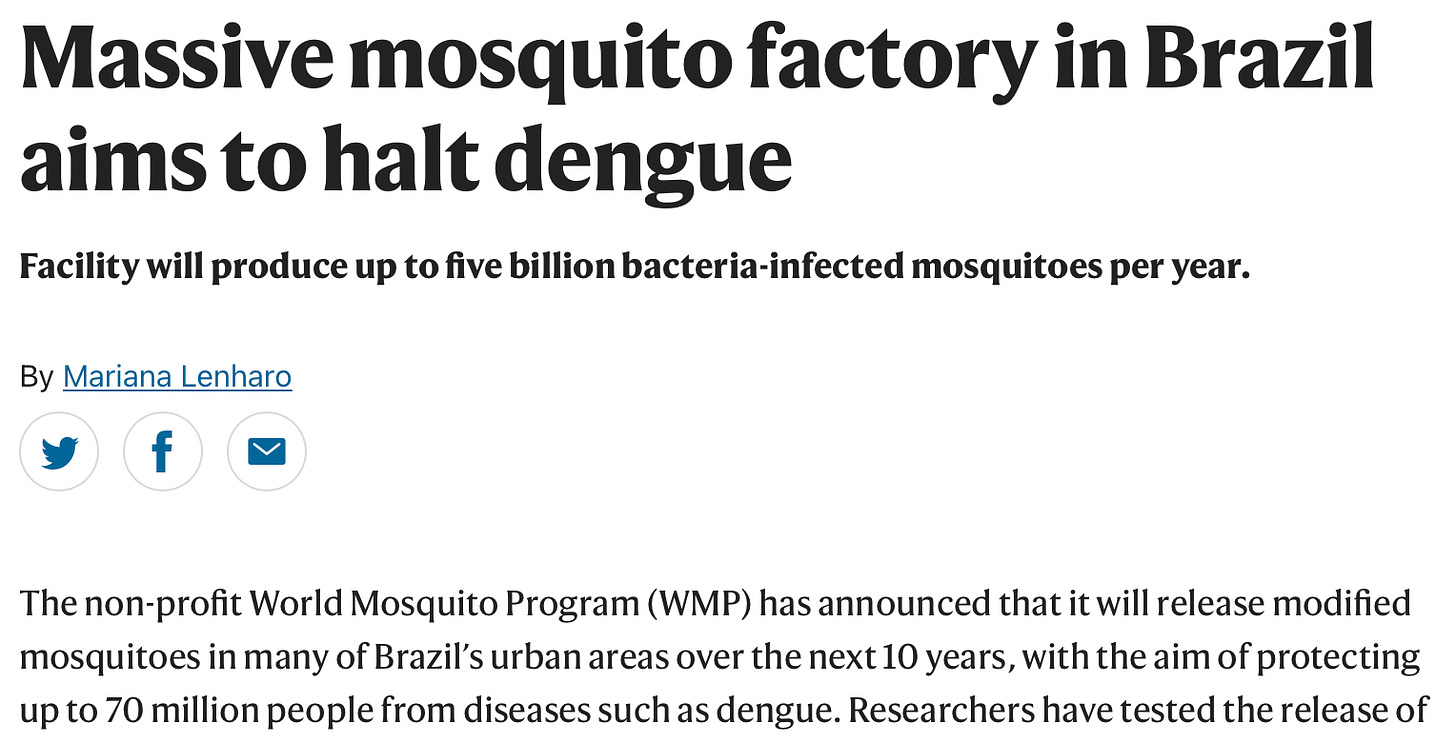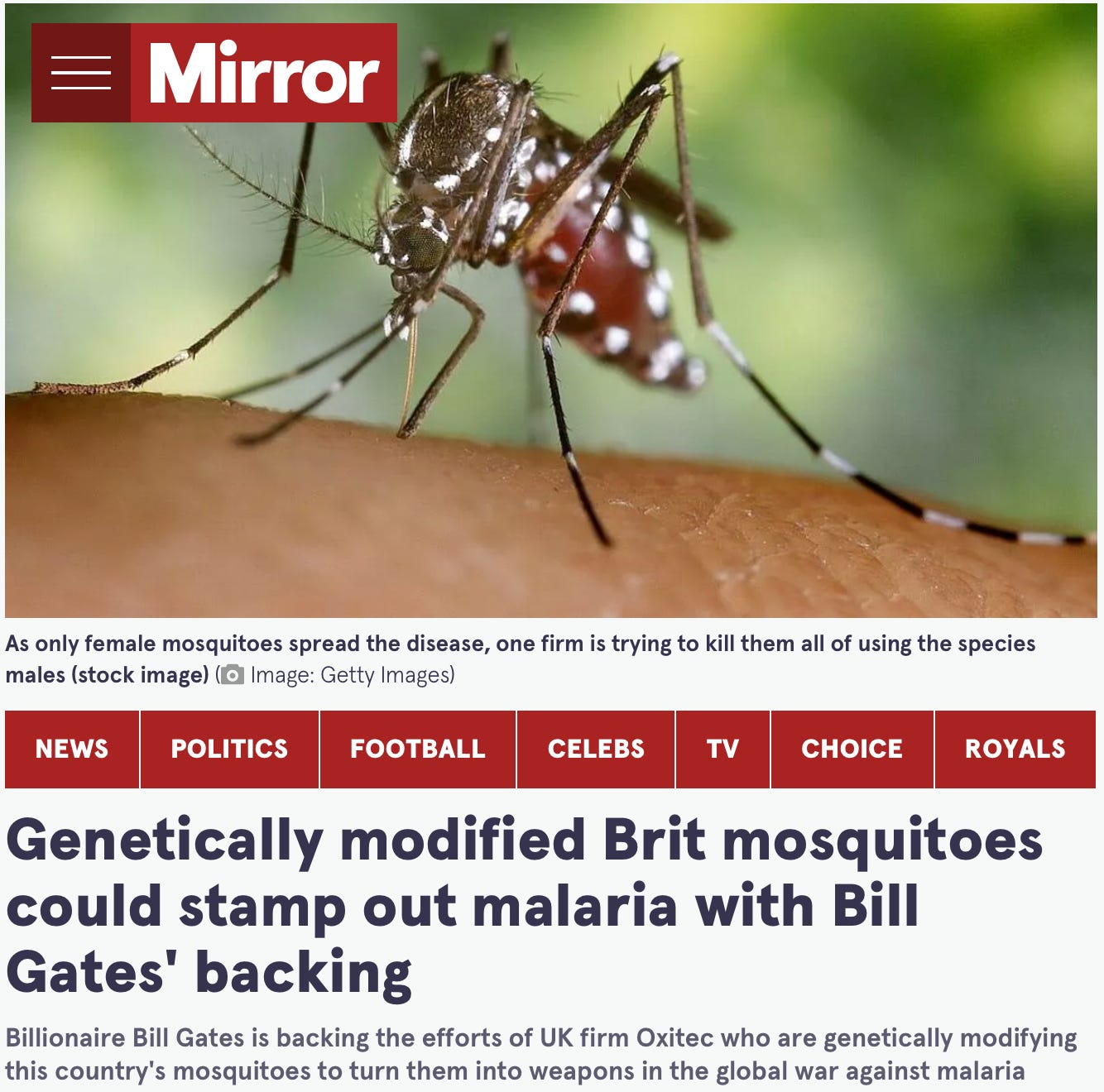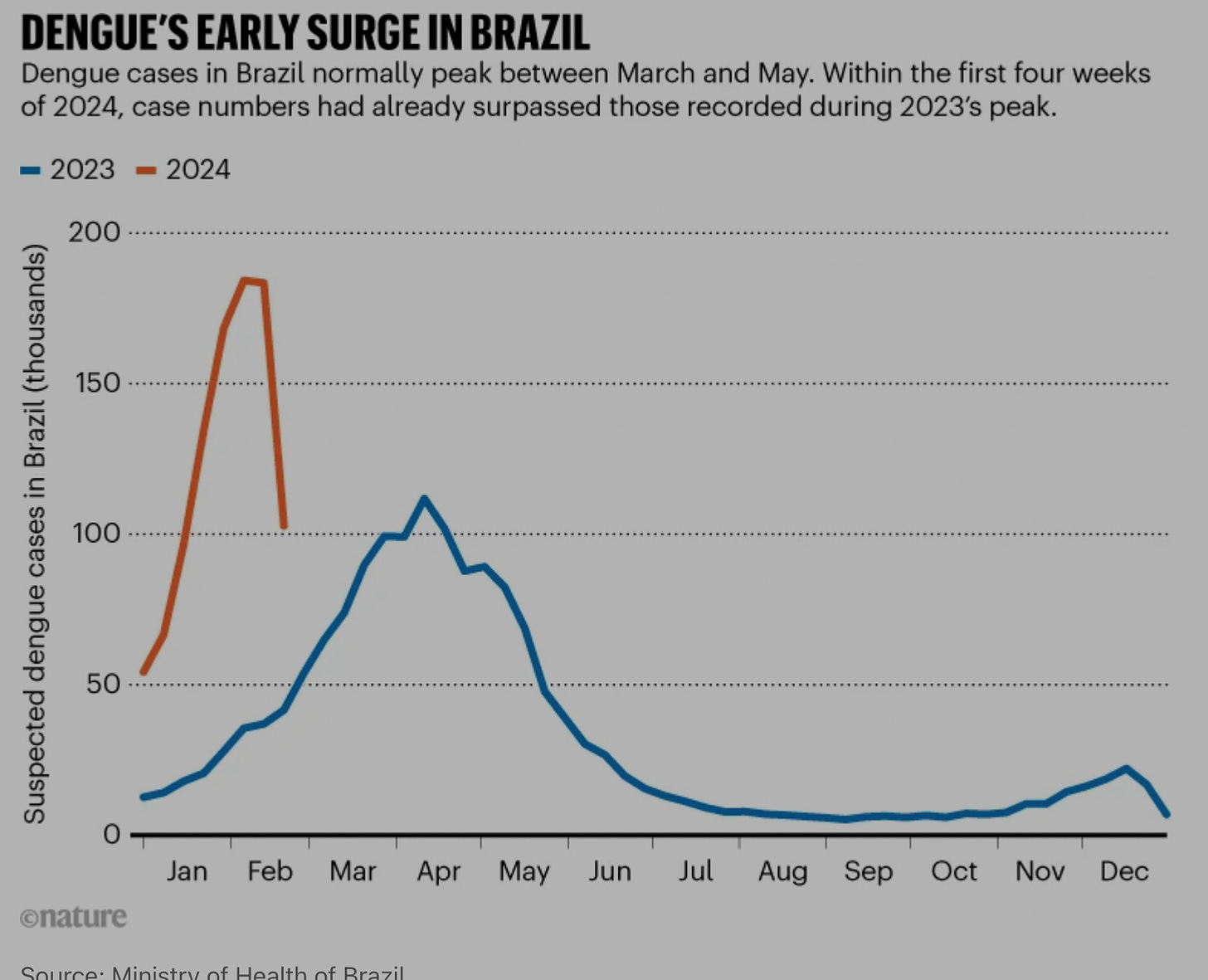Weaponized Gene-Edited Mosquitoes Released in Brazil: Dengue Vaccine Funded by Bill Gates Foundation. Will It Save Lives?
The weaponization of insects is on the drawing board of the Pentagon

All Global Research articles can be read in 51 languages by activating the Translate Website button below the author’s name (only available in desktop version).
To receive Global Research’s Daily Newsletter (selected articles), click here.
Click the share button above to email/forward this article to your friends and colleagues. Follow us on Instagram and Twitter and subscribe to our Telegram Channel. Feel free to repost and share widely Global Research articles.
Big Tech’s Effort to Silence Truth-tellers: Global Research Online Referral Campaign
***
[First published on October 3, 2019]
Introduction
There are several dimensions to the mosquito crisis.
The release of gene-edited male mosquitoes, coupled with the development of a dengue and malaria vaccine.
But that is but the tip of the iceberg.
According to F. William Engdahl in 2018, the weaponization of insects is on the drawing board of the Pentagon:
There is strong evidence that the Pentagon, through its research and development agency, DARPA, is developing genetically modified insects that would be capable of destroying agriculture crops of a potential enemy. The claim has been denied by DARPA, but leading biologists have sounded the alarm on what is taking place using new “gene-editing” CRISPR technology to in effect weaponize insects. It’s like a 21st Century update of the Biblical plague of locusts, only potentially far worse.
Under the DARPA project, Genetic Alteration Agents or viruses will be introduced into the insect population to directly influence the genetic makeup of crops.
DARPA plans to use leaf hoppers, white flies, and aphids to introduce select viruses into crops. Among other dubious claims they say it will help farmers combat “climate change.” What no one can answer, especially as neither the Pentagon nor the US FDA are asking, is how will the genetically engineered viruses in the insects interact with other microorganisms in the environment?
If crops are constantly being inundated by genetically modified viruses, how could this could alter the genetics and immune systems of humans who depend on the crops?
See F. William Engdahl, Why Is the Pentagon “Weaponizing Insects”? October 30, 2018
The Release of 5 Billion Gene-edited Mosquitoes in Brazil. Will It Save Lives?
“It may sound like the premise for a horror movie, or a biblical plague”:
The World Mosquito Program plans to release five billion mosquitoes into Brazil.
“And the hope is they will help save lives.
“[Once] you see the reductions in disease transmission, it doesn’t seem like a horror movie any more,” Scott O’Neill, director of the World Mosquito Program” (CBC, April 2023)
Implemented concurrently with the influx of 5 billion friendly mosquitoes, Brazil approved in March 2023 a vaccine against dengue.
In turn, the Brazilian government has confirmed its support for the creation of a Mosquito Factory which is slated to produce 5 billion mosquitoes a year starting in 2024.
I should mention that the British Company Oxitec has been actively involved in the development of genetically modified mosquitoes in the course of the last eight years:
“They will mate with the females of the ordinary mosquitoes, spawning babies with a genetically inbuilt flaw that causes them to die quickly.
Oxitec says its factory in the town of Piracicaba, northwest of Sao Paulo, can produce 60 million mutant mosquitoes a week.” (Phys.org, 2016)

Coordination of “Mosquito Production” and Vaccine Against Dengue
There is a coordination of Brazil’s factory production of gene-edited mosquitoes with that of the vaccine to halt dengue by the non-profit World Mosquito Program (WMP) funded by Big Pharma’s Wellcome Trust and the Bill and Melinda Gates foundation.
“These mosquitoes are allies in the fight against dengue and other deadly viruses.”
“The demand for these lifesaving mosquitoes continues to grow and that means the World Mosquito Program needs to produce hundreds of millions of Wolbachia mosquitoes.
This might sound the beginnings of a Hollywood writer’s horror film plot.
But it’s not.
This factory is real.
And the mosquitoes being released don’t terrorize the local population. Far from it. They’re actually helping to save and improve millions of lives.
That brings us back to the factory in Medellín, which is currently the world’s largest mosquito breeding facility in the world, producing more than 30 million mosquitoes per week. [1.5 billion per annum]
With regard to the Vaccine against Dengue, more than 3 million people are slated to receive the jab against Dengue in 2024” (CBC Report, April 2023, That report was published almost a year ago).
The 2024 Brazil “Mosquito Horror Story”
Today Brazil is experiencing something beyond the “The Premise for A Horror Movie”.
The release of 5 billion male gene-edited mosquitoes in 2023 was intended to REDUCE the number of mosquitoes in Brazil.
The underlying logic was that the male gene-edited mosquitoes would be mating with normal female mosquitoes with a view to undermining the reproductive process and significantly reducing the number of normal mosquitoes.
That did not happen.
What is now happening is exactly the opposite. Early 2024: There is a tendency for the number mosquitoes to increase. WHY?
Brazil’s Health Minister casually blames it on the hot weather and “above-average rainfall.”
According to a Yale University research project quoted by Engdahl,
“some of the [gene edited] mosquitoes likely have “hybrid vigor,” resulting from “a hybrid of the natural mosquito with the gene-edited mosquito.”
What has occurred is the creation of “a more robust population than the pre-release population [of mosquitoes] which may be more resistant to insecticides, in short, resistant “super mosquitoes.””
What’s the OUTCOME?
According to Engdahl:
After an initial period in which the target mosquito population markedly declined, after about 18 months the mosquito population recovered to pre-release levels.

August 2023
Here is the official media narrative, which blatantly contradicts what is actually happening:
“The firm has developed a version of the male Aedes aegypti mosquito which carries a gene that kills female offspring before they reach maturity, suppressing the population. Only female mosquitoes bite and transmit diseases.
Eggs for the mosquitoes are placed inside a box and water is added to activate them.
“They complete the cycle inside these boxes in about ten days and the adult insects come out to do their work,” said Oxitec’s general manager in Brazil, Natalia Ferreira.
As the modified mosquitoes are released in a given region, they proliferate and the total population of the insect decreases. (Reuters, 28, February, 2024, emphasis added)
See video below.
According to F. William Engdahl:
“This once more highlights the dangers of uncontrolled gene-editing of species”, generously funded by the Gates Foundation.
The Gates Foundation’s Dengue and Malaria Vaccine
According to The Guardian,
“in the first five weeks of this year [2024], 364,855 cases of infection have been reported, the health ministry [Brazil] said, four times more than dengue cases in the same period of 2023.”
Below are the figures of Brazil’s Ministry of Health, comparing 2023 and 2024.

Is this surge in dengue infection the result of hot weather and “above-average rainfall” as outlined by Ministry of Health?
Or is it the result of the release of the 5 billion gene-edited “modified mosquitoes” in 2023?
The impacts of the release of gene-edited mosquitoes have over the years been the object of extensive laboratory research.
Was there foreknowledge in terms of prior scientific research as to what was going to happen, namely the surge in the number of hybrid “Super Mosquitoes” as well as the reproduction (through the mating process) of the hybrid variety of mosquitoes?
Brazil had committed itself to supporting the factory production of gene-edited mosquitoes, with a commitment to release another 5 billion gene-edited mosquitoes in 2024. Will that project be carried out?

SEATTLE — To accelerate the development of a vaccine to prevent dengue and dengue hemorrhagic fever, debilitating diseases affecting children in the developing world, the Bill & Melinda Gates Foundation today announced a $55 million grant to the International Vaccine Institute (IVI) to support the Pediatric Dengue Vaccine Initiative (PDVI).
This posting includes excerpts from Jordan Shachtel, Amie Wek and Jamie White followed by the article of F. William Engdahl.
By Jordan Schachtel
The World Health Organization and its partner organization, the Bill Gates-controlled GAVI, announced Wednesday [July 2023] that they will be flooding Africa with 18 million doses of malaria vaccines.
During a Wednesday press conference, [July 2023] WHO director Tedros Adhanom declared that 12 African countries will be receiving 18 million doses of malaria vaccine in the coming months, declaring that climate change is largely responsible for the continuing disease burden in the continent.
Now, Gates Inc and its middleman partners have released a white paper detailing their roadmap for the deployment of these shots. They are seeking to establish a system in which 80-100 million shots are injected into the arms of sub Saharan African children on an annual basis by 2030. This would create a malaria vaccine industry in Africa that is poised to rake in close to $1 billion annually.

There is no evidence that these shots work to prevent malaria, but that hasn’t stopped Big Pharma and global “Public Health” institutions from executing its designs upon the African continent.
(Jordan Schachtel, The Weaponization of Mosquitoes: WHO and Gates Inc Announce Plans to Flood Africa with Ultra Dangerous Malaria “Vaccines”, Global Research, July 2023)
By Amy Wek
Inside a two-story brick building in Medellín, Colombia, scientists work in muggy labs breeding 30 million genetically modified mosquitoes weekly in labs.
They tend to the insects’ every need as they grow from larvae to pupae to adults, keeping the temperature just right and feeding them generous helpings of fishmeal, sugar, and, of course, blood. They are then released into the wild in 11 countries.
Billionaire Bill Gates, who is funding the project, assures us it’s not a scene from a horror movie.
“The factory is real. And the mosquitoes that are released do not terrorize the locals. They help save and improve millions of lives.”
Just as his ‘covid vaccines’ have ‘saved’ millions of lives or his’ previous vaccination projects have left thousands of women sterile in India and Kenya. Or even his Polio vaccines have caused paralysis, seizure, and febrile convulsions in Sub-Saharan Africa, Afghanistan, Congo, and the Philippines.
(Amy Mek, Warning: Gates-Funded Factory Breeds 30 Million Mosquitoes a Week for Release in 11 Countries, Global Research, March 2, 2024)
By Jamie White
“Dengue fever has spiked fourfold in Brazil in 2024 following the release of millions of gene-edited mosquitoes by the United Nations’ World Mosquito Program.”
In the first five weeks of 2024, over 364,000 cases of dengue infection have been reported, according to the country’s health ministry, which is 4x greater than previous cases in the same period of 2023.
The dramatic spike in dengue cases has prompted Brazil to purchase millions of doses of the dengue vaccine.
Warning: Gates-Funded Factory Breeds 30 Million Mosquitoes a Week for Release in 11 Countries
The Dengue Vaccine
“Brazil has bought 5.2m doses of the dengue vaccine Qdenga, developed by Japanese drugmaker Takeda, with another 1.32m doses provided at no cost to the government, a ministry statement said.
Three Brazilian states have declared emergencies, including the second most populous state, Minas Gerais, and the Federal District, where the capital, Brasília, is located and is facing an unprecedented rise in infections.
Brasília will start vaccinating children aged 10-14 on Friday with Qdenga, the local government said on Wednesday.
Cases of dengue in Brasília since the start of the year have exceeded the total for the whole of 2023, with a rate of infection of 1,625 cases per 100,000 inhabitants, compared with the national average of just 170.
The UN’s World Mosquito Program announced in 2023 a plan to release billions of gene-edited mosquitoes in Brazil over a 10-year period in a bid to eradicate dengue fever in the country.
“Brazilian health officials in five cities have been releasing clouds of lab-grown Aedes aegypti mosquitoes infected with Wolbachia bacteria, which prevents dengue virus transmission to humans,” Harvard Public Health reported in August 2023.
“The country will be the first to launch a nationwide program to release Wolbachia-modified mosquito And it’s building a factory to scale up mosquito production: Beginning 2024, the factory will mass-produce five billion mosquitoes a year.”
Now a year after the mosquito initiative began, dengue cases have risen sharply rather than fallen.
Notably, the World Mosquito Program received a $50 million grant from the Bill & Melinda Gates Foundation.
The Bill & Melinda Gates Foundation is also bankrolling research into the dengue fever vaccine.
The Brazilian government purchased over 5 million doses of the Qdenga dengue fever vaccine, manufactured by Japanese drugmaker Takeda, which also received millions of dollars in grants from the Bill & Melinda Gates Foundation.
In other words, Bill Gates Foundation money is involved in all sides of the situation, from the gene-edited mosquitoes — which has apparently exacerbated the dengue crisis — to bankrolling companies who are providing the in-demand dengue fever vaccine to Brazil.
To what end?
(Jamie White, Money and Weaponized Mosquitoes: Dengue Fever Surges by 400% in Brazil After Bill Gates-Backed Gene-Edited Mosquitoes Released , March 01, 2024)
Will It Save Lives?
Read the incisive analysis of William Engdahl below.
See also Enghahl’s earlier article entitled
Why Did Gates and the Pentagon Release “Gene Edited” (GMO) Mosquitoes in Florida Keys?
By F. William Engdahl, November 18, 2023
Gene-Edited Mosquitoes: Catastrophe in Brazil,
a Gates Foundation Project. Will It Save Lives?
by
F. William Engdahl
A British-American gene-editing company has released millions of genetically modified mosquitoes containing a dominant lethal gene, each week for 27 months in the Bahia, Brazil region in a test to see if the gene-edited mosquitoes would mate with local mosquitoes carrying Zika, malaria or other mosquito-borne diseases.
A new study documents the alarming fact that following an initial reduction of the target population of mosquitoes, after some months the “population which had been greatly suppressed rebounded to nearly pre-release levels.” Scientists to date have no idea what dangers are presented by the new mutations. This once more highlights the dangers of uncontrolled gene-editing of species.
According to a new published study in Nature Reports journal, genetically engineered mosquitoes produced by the biotech company, Oxitec, now part of the US company Intrexon, have escaped human control after trials in Brazil and are now spreading in the environment.
On paper the theory was brilliant. Strains of “yellow fever” male mosquitoes taken from Cuba and Mexico were altered using gene-editing to make it impossible for their offspring to survive. Oxitec then began a systematic release of tens of millions of the manipulated mosquitoes over more than two years in the the city of Jacobina in the region of Bahia in Brazil. The Oxitec theory was the altered mosquitoes would mate with normal females of the same type which carry infectious diseases like dengue fever, and kill them off in the process.
‘Unanticipated Outcome…’ Breeding “Super Mosquitoes”
A team of scientists from Yale University and several scientific institutes in Brazil monitored the progress of the experiment. What they found is alarming in the extreme.
After an initial period in which the target mosquito population markedly declined, after about 18 months the mosquito population recovered to pre-release levels.
Not only that, the paper notes that some of the mosquitoes likely have “hybrid vigor,” in which a hybrid of the natural with the gene-edited has created “a more robust population than the pre-release population” which may be more resistant to insecticides, in short, resistant “super mosquitoes.”
The scientists note that,
“Genetic sampling from the target population six, 12, and 27–30 months after releases commenced provides clear evidence that portions of the transgenic strain genome have been incorporated into the target population. Evidently, rare viable hybrid offspring between the release strain and the Jacobina population are sufficiently robust to be able to reproduce in nature…” They continue, “Thus, Jacobina Ae. aegypti are now a mix of three populations. It is unclear how this may affect disease transmission or affect other efforts to control these dangerous vectors.”
They estimate that between 10% and 60% of the Bahia natural Ae. Aegypti mosquitoes now had some gene-edited OX513A genome. They conclude that “The three populations forming the tri-hybrid population now in Jacobina (Cuba/Mexico/Brazil) are genetically quite distinct, very likely resulting in a more robust population than the pre-release population due to hybrid vigor.”
This was not supposed to happen. Professor of ecology and evolutionary biology, Jeffrey Powell, senior author of the study, remarked on the findings:
“The claim was that genes from the release strain would not get into the general population because offspring would die. That obviously was not what happened.” Powell went on to note, “But it is the unanticipated outcome that is concerning.”
A Gates Foundation Project
The Brazil study deals a major alarm signal on the uncontrolled release of gene-edited species into nature. It calls to mind the horror plot of Michael Crichton’s 1969 science fiction novel, Andromeda Strain. Only it is no novel.
The Oxitec mosquitoes were developed using a highly controversial form of gene-editing known as gene drive. Gene Drive, which is also being heavily funded by the Pentagon’s DARPA, combined with CRISPR gene-editing, aims to force a genetic modification to spread through an entire population, whether of mosquitoes or potentially humans, in just a few generations.
The scientist who first suggested developing gene drives in gene-editing, Harvard biologist Kevin Esvelt, has publicly warned that development of gene editing in conjunction with gene drive technologies has alarming potential to go awry. He notes how often CRISPR messes up and the likelihood of protective mutations arising, making even benign gene drives aggressive. He stresses,
“Just a few engineered organisms could irrevocably alter an ecosystem.”
Esvelt’s computer gene drive simulations calculated that a resulting edited gene “can spread to 99 percent of a population in as few as 10 generations, and persist for more than 200 generations.” This is very much what has now been demonstrated in the mosquito experiment in Brazil.
Notable is the fact that the Oxitec Brazil mosquito experiment was funded by the Bill & Melinda Gates Foundation. In June, 2018 Oxitec announced a joint venture with the Gates Foundation, “to develop a new strain of Oxitec’s self-limiting Friendly™ Mosquitoes to combat a mosquito species that spreads malaria in the Western Hemisphere.” The Brazil results show the experiment is a catastrophic failure as the new strain is anything but self-limiting.
The Gates Foundation and Bill Gates have been backing development of the radical gene-editing technology and gene drive technology for more than a decade. Gates, a long-time advocate of eugenics, population control and of GMO, is a strong gene-editing promoter.
In an article in the May/June 2018 magazine of the New York Council on Foreign Relations, Foreign Affairs, Gates hails gene editing technologies, explicitly CRISPR. In the article Gates argues that CRISPR and other gene-editing techniques should be used globally to meet growing demand for food and to improve disease prevention, particularly for malaria. In his article he adds,
“there is reason to be optimistic that creating gene drives in malaria-spreading mosquitoes will not do much, if any, harm to the environment.”
Every bit as alarming as the failure of the Brazil gene-editing mosquito experiment is the fact that this technology is being spread with virtually no prior health or safety testing by truly independent government institutions. To date the US Government relies only on industry safety assurances. The EU, while formally responsible to treat gene-edited species similarly to GMO plants, is reportedly trying to loosen the regulations. China, a major research center for gene-editing, has extremely lax controls. Recently a Chinese scientist announced an experiment in human gene-editing allegedly to make newborn twins resistant to HIV. Other experiments are proliferating around the world with gene-edited animals and even salmon. The precautionary principle has been thrown to the winds when it comes to the new gene-editing revolution, not a reassuring situation.
Currently Oxitec, which denies that the Brazil results show failure, is now trying to get regulatory approval from the US Environmental Protection Agency to conduct a similar experiment with the same gene-edited species in Texas and Florida. One of the people involved in the attempt, Texan Roy Bailey, is a Washington lobbyist and close friend of Randal Kirk, the billionaire CEO of Intrexon, owner of Oxitec. Bailey is also a major Trump fundraiser. Let’s hope that regulatory prudence and not politics decide the outcome.
see also:
Why Did Gates and the Pentagon Release “Gene Edited” (GMO) Mosquitoes in Florida Keys?
By F. William Engdahl, November 18, 2023
*
F. William Engdahl is strategic risk consultant and lecturer, he holds a degree in politics from Princeton University and is a best-selling author on oil and geopolitics, exclusively for the online magazine “New Eastern Outlook” where this article was originally published. He is a frequent contributor to Global Research.
Note to readers: Please click the share button above. Follow us on Instagram and Twitter and subscribe to our Telegram Channel. Feel free to repost and share widely Global Research articles.

